No matter how old you are, it’s likely that you will need to compile a resume at some point in your life. It can be daunting for anyone, especially if it’s the first time you’ve done so. A CV or resume is a document that highlights your skills and experience as they pertain to prospective employers. However, depending on your age, work history, and education level may make compiling one slightly more challenging than usual. If you have recently graduated from high school or college and are looking to get into the field of juvenile counseling, a resume is an essential tool when applying for jobs. Fortunately, we understand the difficulties of creating a resume as a young applicant because we, too, were once in your shoes! That’s why we’ve created this helpful guide – packed with examples and tips – on creating an impressive resume that will impress hiring managers at any company!
Juvenile Counselor Resume Example

Download This Juvenile Counselor Resume as PDF
Youth services coordinator Resume Example
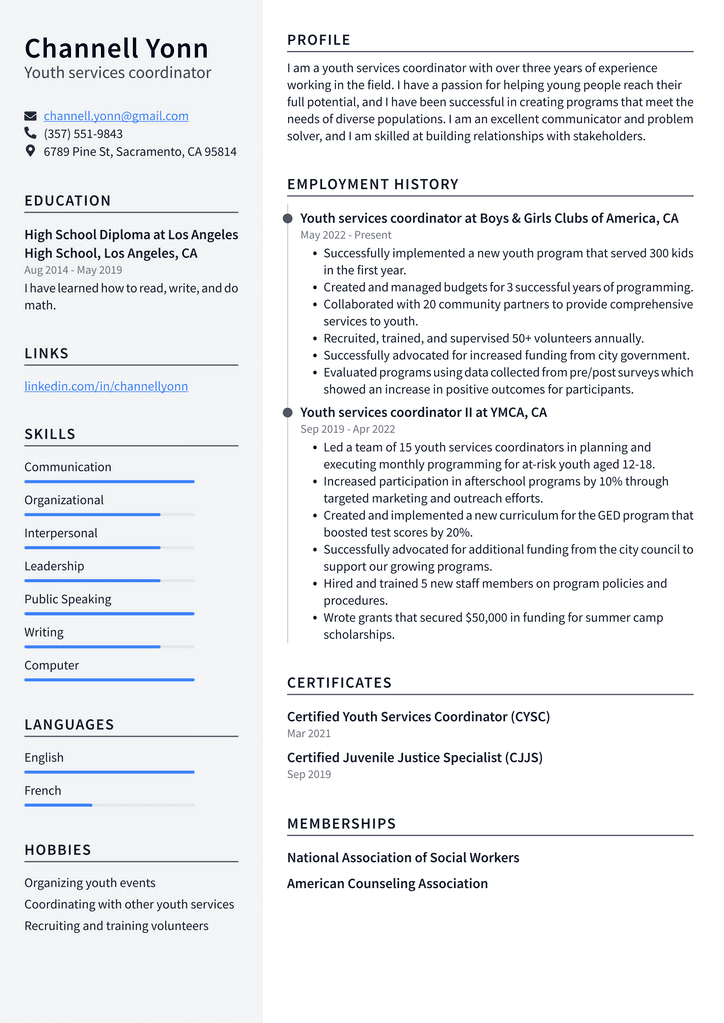
Download This Youth services coordinator Resume as PDF
Youth counselor Resume Example
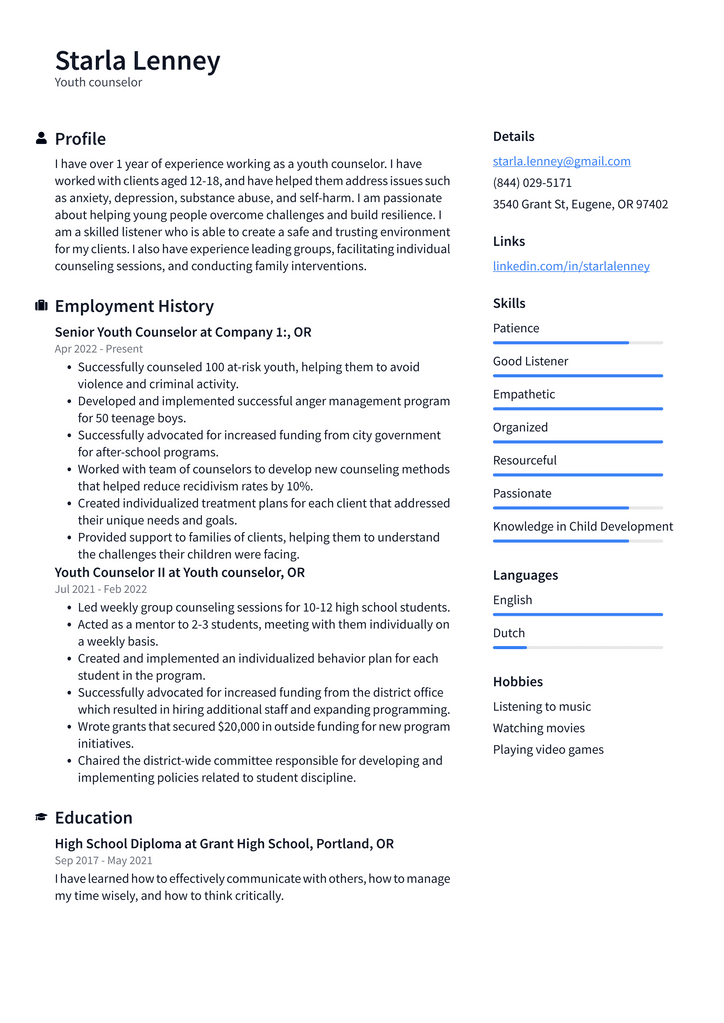
Download This Youth counselor Resume as PDF
Juvenile probation officer Resume Example
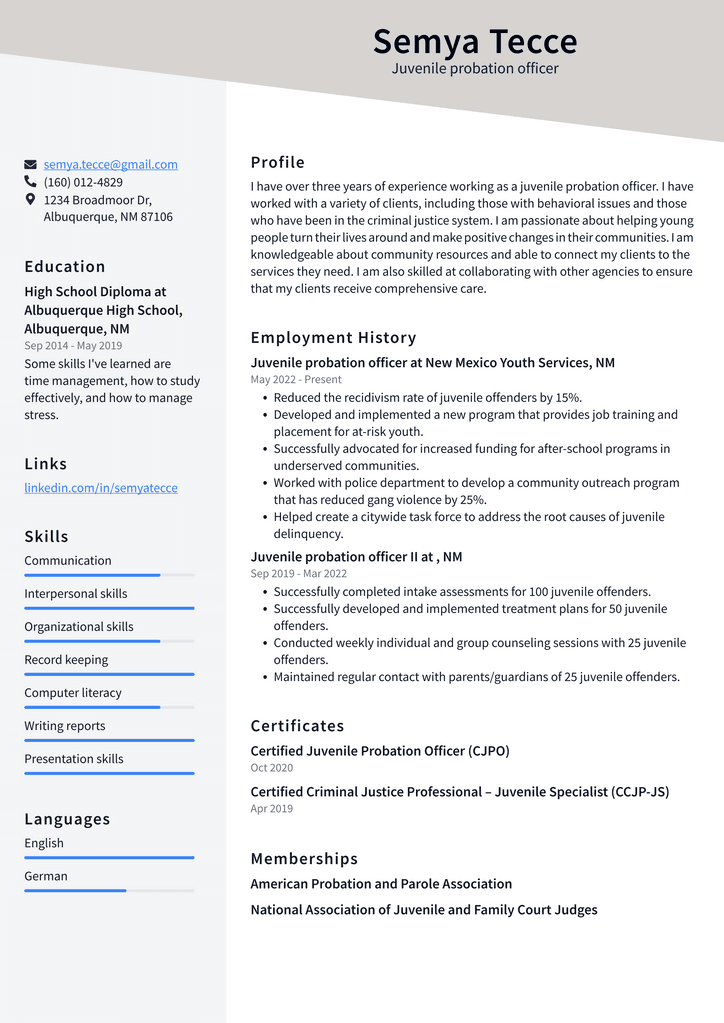
Download This Juvenile probation officer Resume as PDF
Youth program coordinator Resume Example
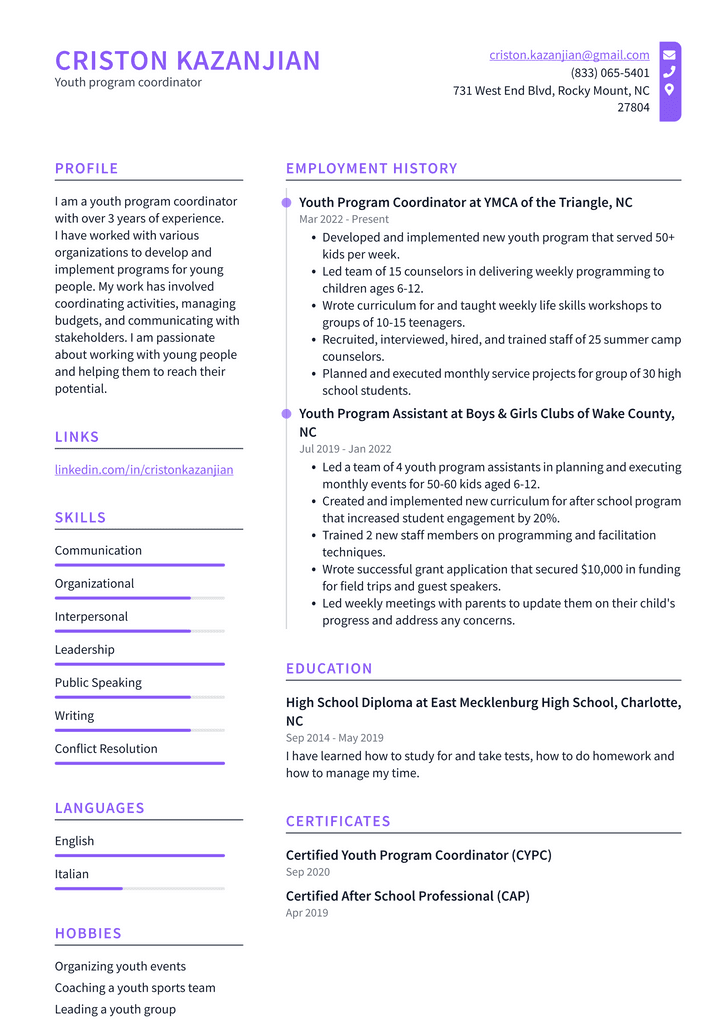
Download This Youth program coordinator Resume as PDF
Youth development specialist Resume Example
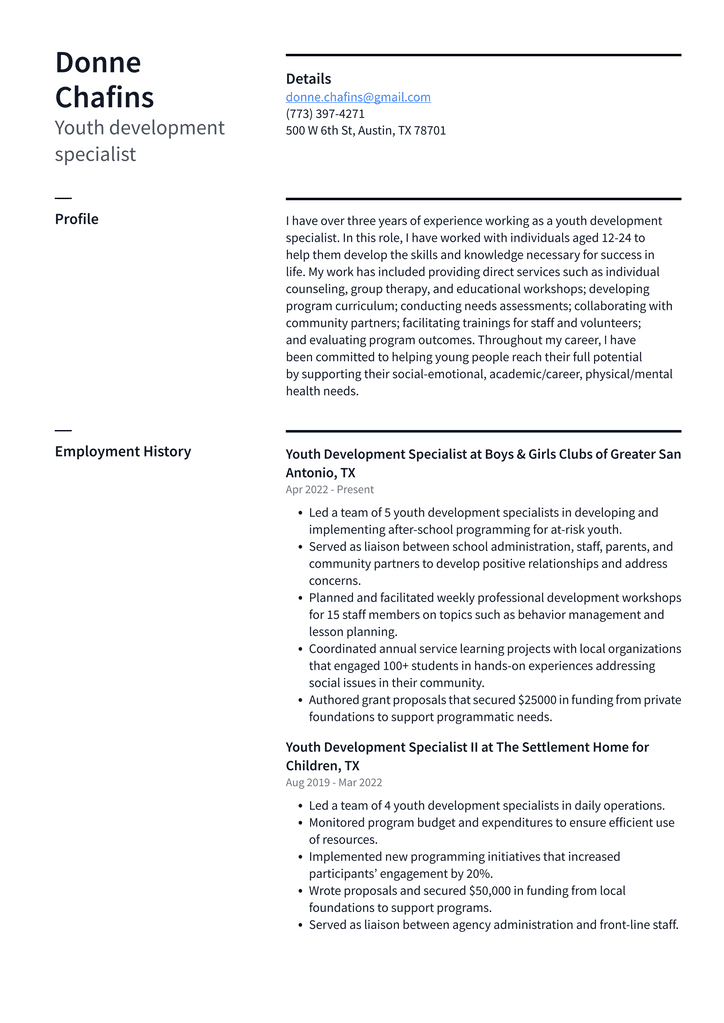
Download This Youth development specialist Resume as PDF
Youth case manager Resume Example
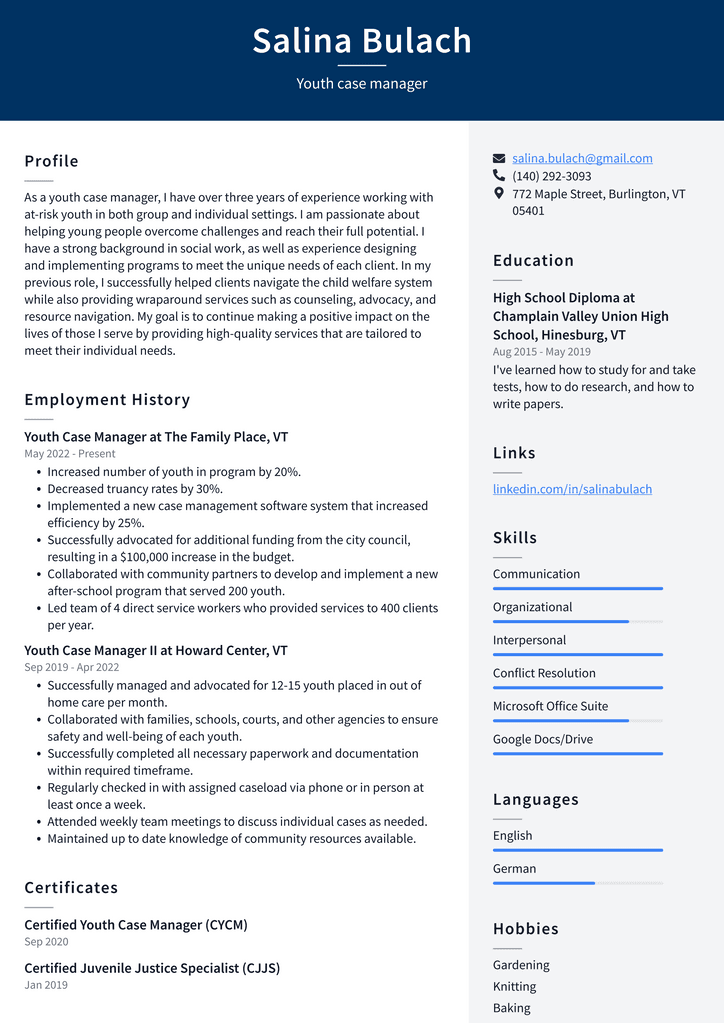
Download This Youth case manager Resume as PDF
Tips for Creating a Resume for Juvenile Counselors
– Use the present tense – Present tense is the appropriate one when writing a resume. It shows the reader that you are currently engaged in the industry. If your resume is written in the past tense, it will appear that you are no longer employed in the industry and, therefore, less relevant. – Use bullet points – Bullet points allow you to condense large amounts of information into a few short points. This makes it easier for the reader to understand your experience and skills quickly. – Include a wide range of information – Include everything related to your potential career path. This includes your education (both past and present), volunteer experience, and any special skills. – Keep it brief – Resumes shouldn’t be overly long. Aim to keep your resume between one and two pages. – Use different font sizes and formatting – You can use bold and italic font styles to emphasize critical points within your resume. Likewise, you can also use font size to emphasize certain elements. Other formatting options include underlining, indenting, and spacing. – Avoid using too many graphics and images – Unless you’re applying for jobs in graphic design or advertising, you shouldn’t use graphics or images on your resume.
General Resume Writing Guidelines
– Use a consistent format – Make sure your resume follows a consistent format. This can make it easier for the reader to follow and understand the information you’ve included on your resume. Likewise, it will make it easier for you to complete your resume. – Be honest – Make sure everything on your resume is factual, accurate, and honest. This will ensure that you don’t jeopardize your chances of getting hired by an employer who might decide to run a background check. – Highlight your accomplishments – Your resume is your opportunity to showcase your experience and skills. Highlight your accomplishments, relevant skills, and education to demonstrate your value as a candidate. – Keep it to one page – Resumes should never exceed one page. If your resume is longer than one page, you should break it up into multiple pages. This will make your resume easier to read and more accessible for the employer to navigate.
Choosing the Right Type of Resume
Before you write your first word on your brand new resume, you must determine which type of resume is most appropriate for your situation. There are three main types of resumes that you can use. Depending on your experience, education level, and job title, one of these may be more suitable than the others. – Chronological Resume – This is the most common type of resume. It highlights your employment history and begins with your most recent job. If you’re starting in the field of juvenile counseling, or if you have little to no experience, this is the most appropriate resume to use. – Functional Resume – This type of resume emphasizes your skills and abilities rather than your work history. If you’re new to the workforce, are switching career paths, or want to keep your work history off your resume, this is the best option. – Hybrid Resume – This type of resume combines elements from the chronological and functional resume. This is the best option for people who want to highlight their work history and include their skills.
Critical Elements of a Good Juvenile Counselor Resume
– Make sure that your resume is error-free – The last thing you want to do is give an employer a reason to dismiss you before even reading your resume. A typical resume mistake is using the wrong tense or misspelling a keyword. Double-check your work and enlist the help of a trusted friend or family member if needed. – Use action verbs – A resume is a tool that showcases your experience and skills. Therefore, using action verbs when describing your jobs and experience is essential. Employers want to know what you accomplished while in a specific position, so ensure to include those details. Focus on your achievements – Your resume should highlight your achievements, not just your job duties. Employers want to know how you contributed to the company or increased performance. – Include an Education Section – Most college-aged applicants will have a section for their education. If you are applying for jobs in the field of juvenile counseling, you should include this section on your resume.
The Summary or Profile Section
This section appears at the top of your resume. It’s often referred to as a “Profile” section and is a great place to include your “hook.” The profile section is one of the essential parts of your resume because it gives hiring managers a quick overview of what you can do for them. You can use this section to talk about your skills, experience, and why you are the best candidate for the job. You can also use this section to address any weaknesses in your resume that an employer may see. A deficiency in your resume is not necessarily harmful, but managing it in your profile is essential, so the employer knows precisely why you have it. Keep in mind that this section should be kept short and sweet.
Your Education Section
This is the perfect place to include your academic transcripts, degrees, and certificates that you have earned. You can also write a few sentences about your experience as a student, such as extracurricular activities, internships, and other relevant activities. Likewise, you can also include all relevant coursework that may be helpful in your future careers, such as a class in counseling or psychology. Finally, if you have yet to graduate from college, you should include the name of your institution and the date you plan to receive your degree.
Your Experience Section
This section is where you put all of your previous paid and volunteer experience. Include the name of your employer, job title, dates of employment, and a short description of what you did while working there. This is also where you should include any leadership roles, references, and other relevant information that will help you stand out from other candidates. If you are a recent graduate with little to no work experience, include all pertinent volunteer work you have done in juvenile counseling. This can consist of any mentoring or tutoring that you have done. You can also include any relevant certifications that you have earned.
Should You Include an Objective?
Many people include an “Objective” section at the top of their resume. The “Objective” section is typically used on a chronological resume and states what the job seeker hopes to do in the future. While an “Objective” section can be helpful, you can also accomplish the same goal by writing your “Profile” section. A “Profile” section is a great place to state why you are the best candidate for a job. In addition, it is a great place to address any weaknesses in your resume and why they are unnecessary. Finally, you can also use this section to explain why you want to work for that company.
Writing Your Skills Section
The skills section is where you can showcase your interests and abilities that aren’t necessarily related to your job. It’s a great place to put your hobbies, special skills, and knowledge you’ve acquired from an exciting course or language. Including this information on your resume shows that you have a well-rounded personality and are well-informed. It also indicates that you have interests outside of work, which is an excellent quality in